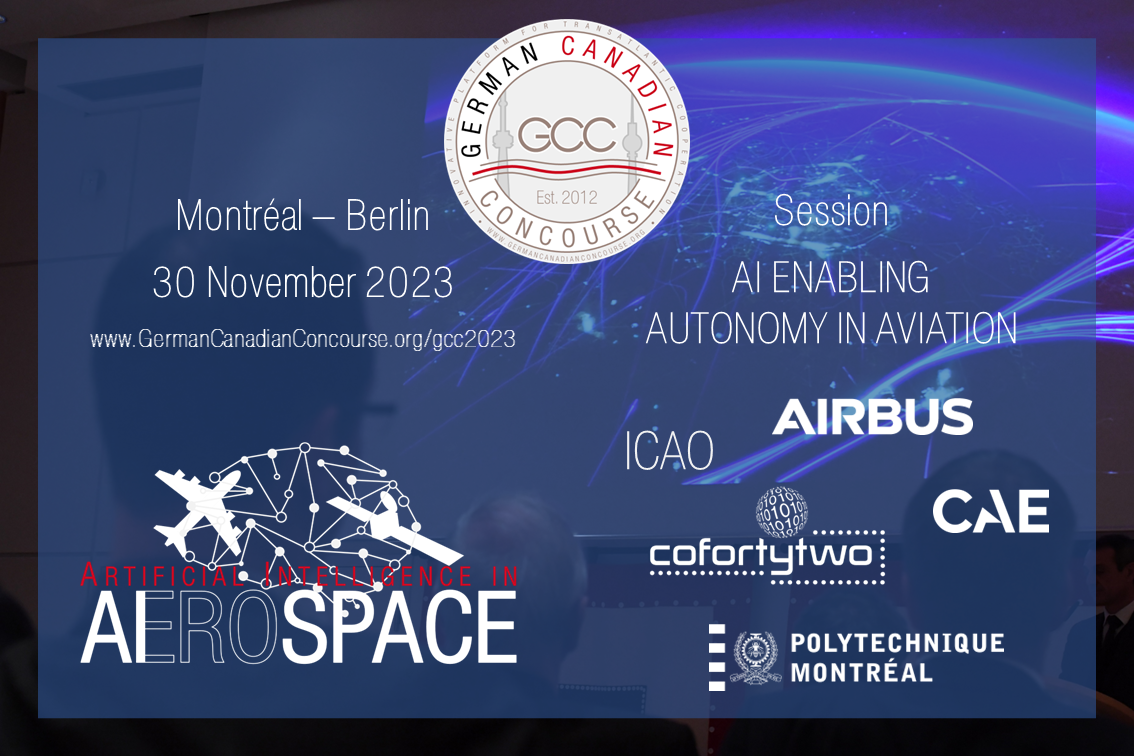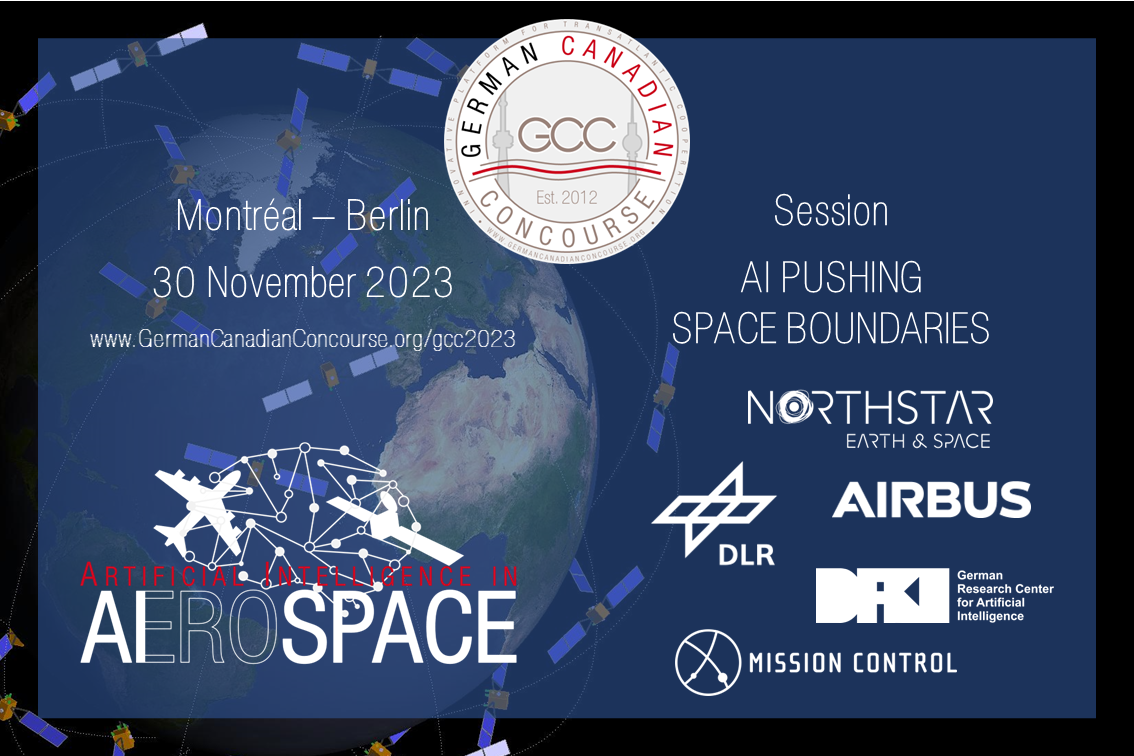|
Announcement – GCC 2023
|
| |

|
|
|
|
SAVE THE DATE
|
30 November 2023
|
McCarthy Tétrault
|
Embassy of Canada
|
|
in Montréal
|
in Berlin
|
|
|
|
|
|
|
|
|
Program Sequence – Overview
|
| |

|
|
|
|
30 November 2023
(all times subject to changes)
|
|
|
|
|
|
|
|
|
- Airbus Helicopters
- Airbus Defence and Space
- CAE
- Consortium de recherche et d'innovation en aérospatiale au Québec (CRIAQ)
- cofortytwo
- DFKI – German Research Centre for Artificial Intelligence
- DLR – German Aerospace Center (German Space Operations Centre)
- ICAO – International Civil Aviation Organization
- McCarthy Tétrault
- Mission Control
- Northstar Earth & Space
- Polytechnique Montréal
|
|
|
|
|
|
Conference Theme
|
| |
As the second installment of the GCC mini-series "AIQ – Canada's
and Germany's Artificial Intelligence Quotient", the GCC 2023 (originally planned for March 2020 but cancelled due to the COVID lockdown) will
resume the discussion of GCC 2019 on Building Synapses of Transatlantic AI
Cooperation. The focus of the upcoming conference will be AI
in the aerospace industry.
AI in Aerospace Industry
The aerospace sector has grasped the potential of AI and there are growing numbers of single-use applications as well as a few end-to-end applications; we are starting to see how AI is impacting and transforming the aerospace industry.
The aerospace industry embraces all activities and services related to aircraft and spacecraft and consists of various stakeholders in governments, corporations, agencies (civil and defense) as well as research institutes and more and more start-ups. Key tasks within the industry are project development, manufacturing and construction, operations, education and training and related research activities. Artificial Intelligence and Deep Learning have entered all these fields; they have the potential to be a game changer.
The GCC 2023 will put a focus on the following AI-related and machine learning aspects in the aerospace domain:
|
|
|
|
Session: AI Enabling Autonomy in Aerospace |
|
|

|
|
|
The session addresses the role of Artificial Intelligence in
advancing the autonomy of aerospace systems (including the fields
of civil aviation, unmanned aerial vehicles and space systems). The
level of autonomy currently in use differs significantly depending
on the application context. While unmanned systems (e.g., UAVs and
drone swarms) already require a high level of autonomy, civil
aviation is not expected to reach full autonomy in the foreseeable
future. Besides maturation of the underlying technology
(algorithms, sensors) and the related technical infrastructure
(high-speed data communication networks), autonomous systems need
to qualified and certified. This is particularly a challenge for
systems relying on Artificial Intelligence and machine learning
techniques which per se are not deterministic.
Besides highlighting the visions for autonomy in aerospace and the
progress made, the session will discuss ways to (virtually) qualify
AI systems for advancing the level of autonomy. We will discuss how
qualification standards can play a role for certification through
regulatory bodies and which role social acceptance plays. We will
address the "Single Pilot Concept" as a hybrid solution introducing
AI replacing the co-pilot and showcases from unmanned flying. We
further will talk about the importance of training and simulation
techniques (using AI) to prepare operators of such systems.
|
|
|
|
Session: AI Pushing Space Boundaries |
|
|

|
|
|
The session addresses ways in which Artificial Intelligence is
enabling new opportunities for space systems. The use of AI in data
analysis is an essential aspect to extract information from large
quantities of mission data and to advance autonomy of complex space
missions. The session aims to showcase the use of AI for object
detection in sensor data applicable in space missions.
AI further plays a role in space situational awareness for improved
tracking of objects in orbit and tracing of space debris, as well
as in analyzing earth observation data. An additional application
is the use of AI for robotics and exploration systems which require
autonomous decision taking due to limited possibilities for
operators to intervene. We will address the question of how
Artificial Intelligence will influence mission
operations.
Spacecraft typically must cope with technical constraints such as
limited computational performance and power resources which pose
additional requirements for the implementation of AI solutions on
board. We will speak about the development of AI models and
embedded solutions under these limitations for specific application
on space-borne systems.
|
|
|
|
Connection to Previous GCC Topics |
|
|
The GCC aims to be at the forefront of an emerging innovative
development and to reflect the German-Canadian context. The topic
of the 2023 event has therefore been chosen deliberately to pave
the way for cooperation between Canada and Germany in an evolving
field of AI. The topic builds on previous GCC conference themes: Cooperation in the Space Sector (2013), Ocean Data Analytics and space-based and airborne
data collection (2016), Autonomous Flying (2017), Artificial Intelligence with a focus on autonomous
mobility (2019).
|
|
|
|
|
|
|
|